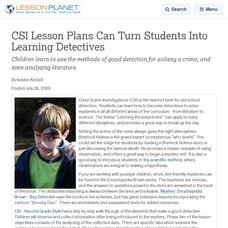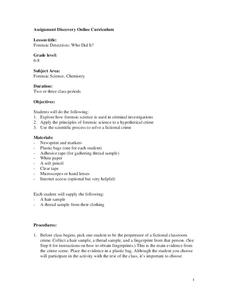Curated OER
My Science Box: DNA Fingerprinting
Students identify DNA in a crime scenario. For this DNA lesson, students perform paper chromatography and compare it against the pens of various suspects.
Curated OER
Hair Test
In this forensic science worksheet, high schoolers write an open response to 1 question on hair evidence photo taken from the crime scene.
Curated OER
Hair Test
In this forensic science worksheet, students write an open response to 2 questions about a picture of hair evidence collected from the crime scene.
Curated OER
A Crime Against Plants
Pupils research the phenomenon that is living in a small tree. They develop their own conclusion on what they believed is occuring. They answer discussion questions to end the lesson.
Curated OER
Hands of Persons Unknown
Students consider the impact of lynchings on the African American community. In this lynching lesson, students investigate the lynching of Claude Neal. Students write opinion pieces about the Claude Neal lynching.
Curated OER
DNA Fingerprinting with Restriction Enzymes
Students will illustrate how restriction enzymes work by piecing together parts of a puzzle. Then they apply this knowledge to help them analyze genetic evidence from the scene of a crime as well as to help them comprehend how a DNA...
Curated OER
"Who Done It?" Analysis of Molecular Fingerprints Left At the Scene of the Crime
Students examine different types of DNA fragments. They record and analyze their results. They determine who is the criminal in the story.
Curated OER
DNA Fingerprinting
Students discuss DNA Fingerprinting and gel electrophoresis before participating in a crime solving activity. Students simulate their DNA using adding tape and complete the steps necessary to do a gel electrophoresis. They discuss the...
Curated OER
CSI Lesson Plans Can Turn Students Into Learning Detectives
Children learn to use the methods of good detection for solving a crime, and even analyzing literature.
Curated OER
Hair
In this forensic science worksheet, learners identify the different parts of the hair. They complete 18 short answer questions on how hair evidence is used in forensics.
Curated OER
Forensic Examination of Artifacts: The Mystery of Meriwether Lewis' Death
Students role play the position of a scientist to gather information on Meriwether Lewis' death. They discover what he did after the famous expedition and how centuries affect the study of a body. They share their information with the...
Curated OER
Blood Analysis
Young scholars reconstruct a crime scene to produce the blood spatter pattern. In this forensic science lesson, students describe the events that lead to produce such patterns. They explain the importance of blood analysis in...
EngageNY
Modeling Relationships with a Line
What linear equation will fit this data, and how close is it? Through discussion and partner work, young mathematicians learn the procedure to determine a regression line in order to make predictions from the data.
Curated OER
Fingerprinting
Students list and describe the three types of fingerprint patterns. They list and describe three layers of fingerprints that can be made. They explain why we leave fingerprints.
Curated OER
Soil Analysis Lesson Plan
Students practice calculating density and examine examples of the physical characteristics of soil. They solve a "crime" based on the evidence and laboratory investigations.
Curated OER
CSI: Native America
Students discuss the murders of Native Americans in Indiana. In groups, they research and make drawings of the scene as if they were part of a CSI team. They complete any needed experiments to help them solve the crime and create a...
Curated OER
Forensic Detectives: Who Did It?
Students explore forensic science and its uses in criminal investigations. They solve a fictional crime by identifying and analyzing the fingerprints, strand of hair, and thread samples for evidence. After completing charts for each,...
Curated OER
Who Done It?
Young scholars work in groups to solve various murder mysteries using DNA evidence to implicate suspects. Teams compete to solve the crimes the fastest, while using various scientific methods to accomplish their task.
Curated OER
Criminal Activities
Students investigate Justice Week in Britain. In this current events lesson, students visit selected websites related to law and order in the U.K. Students may create their own anti-social art as a culminating activity.
Curated OER
Careers in Chemistry
Students watch a video about careers in chemistry. In this Chemistry lesson plan, students will research chemistry careers and chose one to do further research on.
Curated OER
Whodunit?
Pupils observe the geometric patterns on fingerprints. They classify fingerprints into groups and obtain prints from surfaces.
Curated OER
Hair Test
In this forensic science worksheet, learners write an essay about 3 open response questions presented about hair evidence shown on the photo.
Curated OER
Who's Who and How Do You Know for Sure?
Learners investigate the applications of DNA fingerprinting, They read crime scenarios and using the details of the crime and laboratory experimentation decide the suspects guilt or innocence.
Curated OER
Dude, Who Hit My Car?
Students discuss how investigators solve a hit and run accident. In this physical science lesson, students recreate an accident scene using CEENBot. They collect data from the experiment and formulate conclusion.























